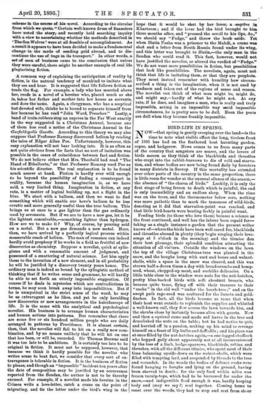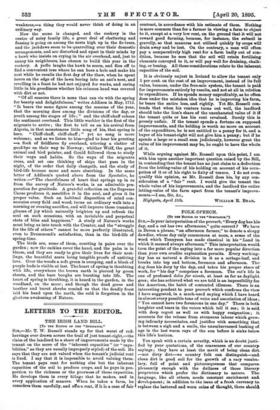BIRD-LIFE IN SPRING.
NOW—that spring is gently creeping over the land—is the time to note what visible effect the long, tireless frost
of 1895 has had on the feathered host haunting garden, copse, and hedgerow. News comes to us from many parts of the country that songsters are scarce, and the lovers of birds mourn as they think of the blackbirds and throstles who crept into the rabbit-burrows to die of cold and starva- tion, and whose bodies are now being found daily by ferreters in many districts in Surrey. If this mortality has extended over other parts of the country in the same proportion, there is little room for wonder at the unusual silence of the season,— the absence of " the charm of birds." Luckily, it is only the first stage of being frozen to death which is painful, the end is only insensibility and an endless sleep. When the rime was on the trees, and the thermometer below zero, nothing was more pathetic than to mark the tameness of wild-birds, denoting as it did that starvation-point was reached, and that little bird-hearts were beating feebly in painful want.
Feeding birds (to those who love them) became a science as the frost continued, and well has the labour been repaid for—
taking as a single instance a garden that the present writer knows of—where the birds have been well cared for, blackbirds and throstles abound in plenty (they begin singing their love- songs at 5 o'clock in the morning) and the titmice don their best plumage, their splendid condition attracting the attention of all visitors. Outside the windows on the lawn the top of the village Christmas-tree was planted in the snow, and the boughs hung with suet and bones and walnut- shells, while a apace in the snow was cleared, and this was strewn half-a-dozen times a day with bread-crumbs and hemp- seed, wheat, chopped-up meat, and suchlike delicacies. On a little table close to the window were nuts for the nut-hatches, pretty blue-backed birds with soft chestnut breasts, who became quite tame, flying off with their treasure to their "cache " in the old wall " under the beech-tree ;" and on the swept path rape-seed was scattered for the linnets and gold- finches. In fact, all the birds became so tame that when their host went outside to replenish the supplies and whistled a well-known call, they flew across the lawn towards him, and
the shrubs close by instantly became alive with guests. Now and then a squirrel came and made sad havoc in the tree and demolished the nuts on the table; but he had notice to quit, and hurried off in a passion, making up his mind to revenge himself on a feast of lily-bulbs and daffodils ; and his place was at once filled by the nut-hatches again,—a one-legged chaffinch who hopped gaily about apparently not at all inconvenienced by the loss of a limb, hedge-sparrows, blackbirds, robins, and thrushes, with all the different titmice, who spent most of their time balancing upside-down on the walnut-shells, which were filled with tempting lard, and suspended by threads to the tree and verandah. In the woods the bodies of defunct rooks were found hanging to boughs and lying on the ground, having been starved to death ; for the only food within miles was frozen turnip-tops, which had to be burrowed for under the snow,—and indigestible food enough it was, hardly keeping body and (may we say ?) soul together. Coming home to roost over the woods, they had to stop and rest from sin er
weakness,—a thing they would never think of doing in an ordinary way. Now the scene is changed, and the rookery is the centre of noisy family life, a great deal of chattering and fussing is going on among the nests high up in the fir-trees, and the jackdaws seem to be quarrelling over their domestic arrangements, and are disturbed and upset in their minds by a hawk who insists on crying in the air overhead, and, just to annoy his neighbours, has chosen to build this year in the rookery. A yaffie laughs the hawk to scorn, and flies off to find a convenient tree where he can bore a hole and make his nest while he recalls the first day of the thaw, when he spent hours on the edge of the lawn boring into an ant's nest, and revelling in a feast he had not enjoyed for weeks, and caring little in his greediness whether his crimson head was covered with dirt or not.
" Of all seasons there is none that can vie with the spring for beauty and delightfulness," writes Addison in May, 1712. "It bears the same figure among the seasons of the year, that the morning does among the divisions of the day, or youth among the stages of life ; " and the chill-chaff echoes the sentiment overhead. This little warbler is the first of the migrants to arrive ; the first to tell us on his arrival from Algeria, in that monotonous little song of his, that spring is here. " Chiff-chaff, chiff-chaff ; " yet no song is more welcome ; and as we listen to him—glad to hear his greeting —a flock of fieldfares fly overhead, uttering a clatter of good-bye on their way to Norway ; whither Wolf, the great animal and bird painter, and Gould followed them to study their ways and habits. So the ways of the migrants cross, and set one thinking of ships that pass in the night, of the order that daily changeth, and the study of bird-life become more and more absorbing. In the same letter of Addison's quoted above from the Spectator, he writes :—" The cheerfulness of heart that springs up in us from the survey of Nature's works, is an admirable pre- paration for gratitude. A grateful reflection on the Supreme Cause produces it, sanctifies it in the soul, and gives it its proper valve. Such an habitual disposition of mind con- secrates every field and wood, turns an ordinary walk into a morning or evening sacrifice, and will improve those transient gleams of joy which naturally brighten up and refresh the soul on such occasions, with an inviolable and perpetual state of bliss and happiness." A study of Nature's works must bring us into touch with the Creator, and the " struggle for the life of others" cannot be more perfectly illustrated, even to Drummond's satisfaction, than in the bird-life of spring-time.
The birds are, some of them, courting in pairs over the garden ; now the catkins cover the hazel, and the palm is in bloom, and they are ready to give their lives for their nest- lings, the beautiful nests being tangible proofs of untiring love. Over the woods a soft green is creeping, and a blush of purple buds is visible at last. The heart of spring is throbbing with life, everywhere the brown earth is pierced by green shoots, and the bare boughs are bursting into life. The heart of spring is throbbing, it is heard in the garden, in the woodland, on the moor; and though the dead gorse and heather and burnt shrubs remind us that the deadly frost laid his hand upon the earth, the cold is forgotten in the glorious awakening of Nature.



































 Previous page
Previous page